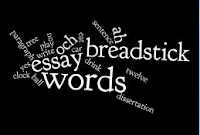She comes to our next session with another beautifully turned vignette. 'Hmm,' I say, after we have read it aloud. 'Tell me, what do you like about this piece of writing?' She picks out a piece of carefully observed detail. 'Yes, I can see how pleasing that is,' I agree. 'And what do you think is missing?' She's not sure. 'What about dialogue?' She points to a few lines of dialogue. 'Let's look at these, shall we?' I write them up on the board. Then I remove all the he saids and she saids. 'Okay, now what is it?' I ask.
It's a poem.
That's how the week starts. It ends with me looking after my grandchildren who are one and two years old. One of our regular outings is to the railway station to watch the trains which they are both very enthusiastic about. Each time a train arrives in the station, or rushes through without stopping, the older of the two turns to me and demands, 'More choo choo trains!'
'There will be more choo choo trains,' I tell him. And for the present he is satisfied. But at last there comes a time when I have had enough of standing there watching my grandchildren watching the trains. 'Time to go home,' I announce. Faces fall. Enthusiasm turns sour. But we cannot stay there forever.
The truth is that there is always a time when you must say bye bye to the choo choo trains even if they are beautifully composed with carefully observed detail and crystalline imagery.



